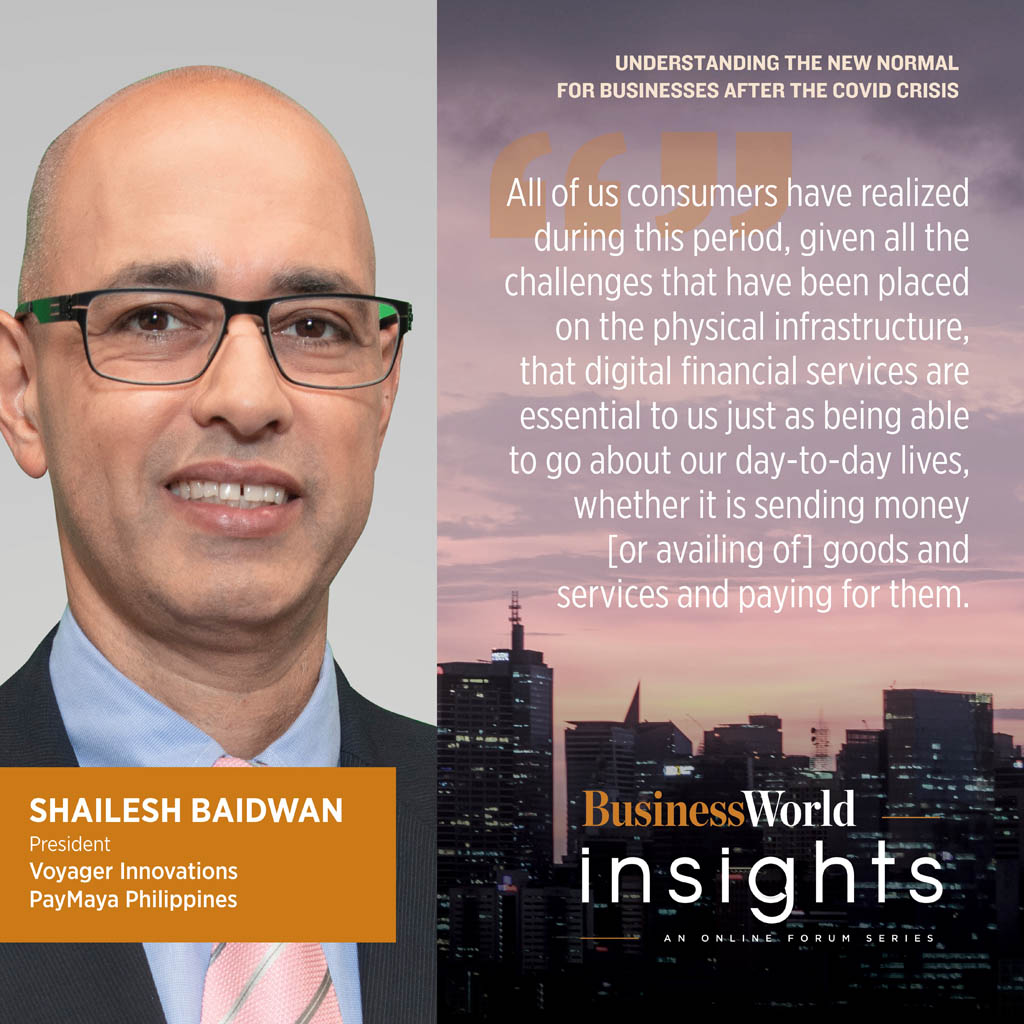By Adrian Paul B. Conoza
Special Features Writer, BusinessWorld
A ‘new normal’ is anticipated to take place once the coronavirus disease 2019 (COVID-19) crisis ends and the enhanced community quarantine (ECQ) is relaxed. As businesses brace for this, understanding what it means for them is worth considering before they welcome such transitions.
The second leg of the Phase 1 of BUSINESSWORLD INSIGHTS has further shed light on this ‘new normal’ that the Philippines is set to encounter.
Moderated by BusinessWorld‘s digital platform editor Santiago Arnaiz, the online forum held last May 6 gathered interesting thoughts from Anthony Oundjian, managing director and senior partner of Boston Consulting Group (BCG); Dr. Raul Destura, deputy executive director of Philippine Genome Center (PGC) at University of the Philippines (System); Dr. Nicole Curato, associate professor of Centre for Deliberative Democracy and Global Governance at University of Canberra; and Shailesh Baidwan, president of Voyager Innovations and PayMaya Philippines.
Preparedness for future pandemics
 Dr. Destura sees the ‘new normal’ upon the lifting of the ECQ to be challenging, as he found that it absolutely will not be the same as before while the virus is still present in the country.
Dr. Destura sees the ‘new normal’ upon the lifting of the ECQ to be challenging, as he found that it absolutely will not be the same as before while the virus is still present in the country.
“Until we are actually able to develop the vaccine [and] control or improve the herd immunity, then the new normal will be a little bit different than what we used to enjoy,” Dr. Destura said.
He pointed out factors he deems very important and crucial for the control of the coronavirus infection, namely identifying active cases for effective contact tracing and continuous awareness of practicing social distancing.
“[Identifying cases] would include more testings going on all around the country, allowing individuals to be identified at the early stages of disease so that their transmission dynamics will be shortened — as opposed to persons undiagnosed spreading the virus with transmission rates of two is to one. This particular intervention is very necessary and very important,” PGC’s deputy executive director said.
Moreover, Dr. Destura highlighted the importance of preparedness in responding to global infectious disease emergencies. For the infectious disease specialist, pandemic preparedness is a very serious area that needs to be addressed on a national and global level.
“In terms of pandemics, there will always be a new version, whether more powerful than what’s happening right now or less. But, what’s necessary is the ability for us to prepare for these particular problems that will arise again in the future,” he said.
He saw the level of preparedness of healthcare workers as the major difference of COVID-19 from past epidemics, adding that even with healthcare systems becoming more advanced than before, the transmission of the virus is very high, given the immense growth in the country’s population size.
The PGC official also noted the significance of modeling during this period, lest that “the number of cases outnumbers our capacity to absorb cases”.
“The purpose of modeling is to actually give us an estimate on how much impact [COVID-19 is] going to get at certain stages of our intervention,” he said. “It will also allow us to determine whether the current intervention is going to help decrease the number of insufficient rates or not.”
For Mr. Destura, the academic community has a vital role during the crisis in providing scientific bases for certain decision-making and providing tools for decision-makers to have better implementation guidelines on relaxing the ECQ in the next couple of weeks.
Hearing out vulnerable communities
 The exacerbation of existing inequalities and the inclusion of most vulnerable communities are important in going to a ‘new normal’ according to Ms. Curato.
The exacerbation of existing inequalities and the inclusion of most vulnerable communities are important in going to a ‘new normal’ according to Ms. Curato.
The sociologist noted that the ‘new normal’ is not new at all since it further deepens the disparity between certain groups in the society.
“For example, if the new normal means there should be physical distancing in public spaces, then this experience is different for people with cars and those waiting for the MRT, which [will take fewer] passengers per train car and consequently making the queues even longer,” she explained.
This ‘new normal’ will thus reveal the “unfortunate obvious truth that the poor will bear the brunt of the new normal”, she added.
Ms. Curato also noted the new normal experience becoming ‘gendered’, especially in terms of working from home.
“Working from home may be the new norm but… working from home is not always safe. We know that homes are sites of domestic inequalities. Recently, the United Nations called for urgent action as reports of domestic violence escalated,” she said.
The associate professor also emphasized the importance of listening to the reasons of communities whom she finds are not often paid attention to. She finds the lack of “listening to the reasons of the most vulnerable Filipinos” as one of the failures in the country’s response to the pandemic.
“I think it’s good that the government tells us what’s ideal but we have to recognize that many Filipinos live in the least ideal of circumstances,” she stressed.
She suggests that stakeholders should create a communication strategy that brings in the most vulnerable communities in the conversation, rather than excluding them.
“The best way to move forward from this pandemic is to just not have an exclusive conversation about opportunities available just for government and business, but putting the most vulnerable communities at the center of this conversation,” she added.
Digital financial services becoming essential
 For Mr. Baidwan of Voyager and PayMaya, digital financial services will be an inevitable part of the new normal, and these services are no longer an option.
For Mr. Baidwan of Voyager and PayMaya, digital financial services will be an inevitable part of the new normal, and these services are no longer an option.
He observes an acceleration of such services on both consumer and enterprise levels.
Among enterprises, Mr. Baidwan sees businesses pushing their digital strategies from being a part of their long-term roadmap into a top priority to be delivered in the next few months.
Consumers, meanwhile, are realizing the advantages of digital payments.
“All of us consumers have realized during this period, given all the challenges that have been placed on the physical infrastructure, that digital financial services are essential to us just as being able to go about our day-to-day lives whether it is sending money [or availing of] goods and services and paying for them,” he said.
He shared that over the last few weeks, they have observed a significant increase in the number of people who are downloading the PayMaya app and using it to send money to continue supporting their loved ones in the provinces, as well as to buy mobile load and data.
Expanding financial inclusion in the Philippines, he said, is one of the big ways to counter the issues brought about by the present crisis.
Accelerating financial inclusion and ensuring wider access to payment, credit, insurance, and all kinds of other services, he added, will greatly help digital financial services to include “a large segment of the society that is today very vulnerable”.
“This is a time we really need to accelerate financial inclusion across the country because that to me will be one of the key factors that can help in the overall lift [of the ECQ], and to help to cushion some of the negative impacts that we will see over the coming months,” he said.
Mr. Baidwan also expounded on the significant roles digital financial services are playing during this crisis, such as enabling consumers and businesses to transact safely as well as helping needy communities access funds from the government and helping the government receive payments.
Adapting to ‘meaningful changes’
 BCG’s Mr. Oundjian, meanwhile, shared that just like in previous major crises in history, meaningful changes will be imminent when the dust of the present crisis settles.
BCG’s Mr. Oundjian, meanwhile, shared that just like in previous major crises in history, meaningful changes will be imminent when the dust of the present crisis settles.
He sees two stages taking place specifically in the COVID-19 crisis. The first stage, he explained, happens for the next few quarters when people still live with a set of constraints related to COVID-19. The following stage will usher in “a more structurally different world once this is behind us”.
The managing director and senior partner of BCG sees digitalization ushering in a significant transition.
“The digitalization of our life, through the shopping, through the way we buy, through the way we interact, I think that will be a fundamental trend,” he said.
He sees the shift to home-based activities as the main change that is taking place among consumers, aside from a “major sustained shift” to digital services.
“We are not just talking about the work from home. We are talking about entertainment at home, consume at home, communicate socially from home,” he said. “For now, it’s by necessity; but we see that a lot of people start to realize actually that it’s quite convenient and it works well, and some of these will stay.”
As the new normal witnesses these significant changes, Mr. Oundjian considers the crisis as a wake-up call for businesses and communities to make their transition to the new normal a meaningful one as well.
“I’m hoping and I believe that this event is an opportunity to step back and realign our model to something which is much more sustainable for the planet but also for communities and something that we give like a fair share to provide the community,” he emphasized.
The next legs of BUSINESSWORLD INSIGHTS will tackle “COVID-19 and The Philippine Stock Market: Uncertainties and Opportunities” on May 13, and can be viewed on the Facebook pages of BusinessWorld and The Philippine STAR.
BUSINESSWORLD INSIGHTS is made possible by sponsors SM, Megaworld Corporation, Globe Telecom, and PayMaya; eLearning platfrom partner Olern; partner organizations Management Association of the Philippines, Philippine Chamber of Commerce and Industry, Philippine Association of National Advertisers, and Bank Marketing Association of the Philippines; and media partner The Philippine STAR.

 Dr. Destura sees the ‘new normal’ upon the lifting of the ECQ to be challenging, as he found that it absolutely will not be the same as before while the virus is still present in the country.
Dr. Destura sees the ‘new normal’ upon the lifting of the ECQ to be challenging, as he found that it absolutely will not be the same as before while the virus is still present in the country. The exacerbation of existing inequalities and the inclusion of most vulnerable communities are important in going to a ‘new normal’ according to Ms. Curato.
The exacerbation of existing inequalities and the inclusion of most vulnerable communities are important in going to a ‘new normal’ according to Ms. Curato. For Mr. Baidwan of Voyager and PayMaya, digital financial services will be an inevitable part of the new normal, and these services are no longer an option.
For Mr. Baidwan of Voyager and PayMaya, digital financial services will be an inevitable part of the new normal, and these services are no longer an option. BCG’s Mr. Oundjian, meanwhile, shared that just like in previous major crises in history, meaningful changes will be imminent when the dust of the present crisis settles.
BCG’s Mr. Oundjian, meanwhile, shared that just like in previous major crises in history, meaningful changes will be imminent when the dust of the present crisis settles.
